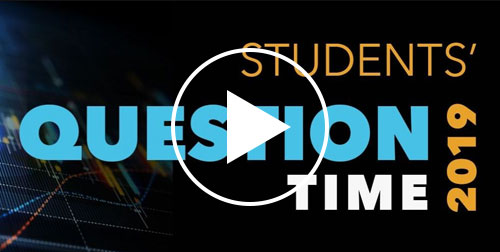Departmental news
Question Time 2019 opens up the debate on global current affairs
Butterworth Hall opened its door to host the seventh annual Warwick Question Time event.
Held in one of the largest art centres in the UK, Butterworth Hall at the Warwick Arts Centre set the stage for an evening of interesting debates on current affairs. The popular debating event is organised by the Department of Economics in conjunction with the Department of Politics and International Studies (PAIS) and is very similar in format to the popular BBC television show.
The event attracted over 1,300 students (mostly first year students) and guests who took their seats to watch this year's panel debating a range of current affair topics: starting with the questions on the UK leaving the EU without a deal and the use of toxic language by politicians to fuel populism and conflict; and moving on to talking about the global economic effect of the protest in Hong Kong. The final part of the debate tackled the issues of climate change and whether we should be altering consumer habits to enable long-term sustainability and what can be done to address gender inequalities in society. To see what suggestions the panellists have made, watch the video which will be published on this page soon.
This year, the panellists were:
- Rachana Shanbhogue, European economics correspondent for The Economist
- Stephen Kinnock, Labour Member of Parliament for Aberavon
- Professor Chris Anderson, Professor in European Politics and Policy at London School of Economics
- Alicia Kearns, Conservative and counter terrorism adviser
- Kulbir Shergill, Director of Social Inclusion at the University of Warwick
- Remi Trovo, Year 2 BA (Hons) Politics and International Studies student
- Paula Bejarano Carbo, Year 3 BSc (Hons) Philiosophy, Politics and Economics student
Chairing the panel was Professor Chris Anderson who commented after the event:
"At the heart of every great university is the quest for knowledge. I really enjoyed being part of Warwick Question Time 2019 because you can only find the right answers if you ask the right questions. I thought the panel tackled some important questions - questions that can be uncomfortable - but in a respectful way and through the lens of students and practitioners working at a high level in their respective fields."
Sohaila Abdelaal, a second year Economics student added:
"The Question Time 2019 panel was very diverse which provided a variety of interesting perspectives. There was a great connection between the panellists and the audience members as they discussed gender equality in the workforce and reflected on their personal experiences."
After the event, students were given the opportunity to speak to panellists during the drinks reception that took place in the Oculus. Feedback from students who attended the event said they enjoyed the lively debate and the opportunity to engage with the panel by asking questions and being able to reply back to their answers during the debate. The annual Question Time event forms part of the induction for newly arrived Economics and PAIS first year students at Warwick.
Missed the debate? Watch the full length video online..
For those of you that missed the event or would like to watch the debate again, the full length video is available online. You can also watch previous years of our Question Time debates on our Warwick Economics YouTube Channel.
Strong overall progress in student satisfaction among Warwick Economics students
We are pleased to announce that the Department of Economics has improved its overall rating in the National Student Survey (NSS) by 6.5% points, with 89% of undergraduate students who took part in the survey agreeing that they were satisfied with the course as a whole.
NSS
The greatest NSS improvements were seen in the categories of assessment and feedback, which saw an 11.3% points increase in satisfaction, and in academic support, where satisfaction rose by 6.9% points. Nonetheless, we acknowledge the need to continue to liaise with students through Student Staff Liaison Committees and other student forums in order to further enhance the student experience of all aspects of teaching, learning and assessment. The Department also came out above the UK national average for Economics which stands at 84% for overall satisfaction.
The highest satisfaction scores were achieved in:
- Student voice: 92.4 per cent of undergraduates agreed that: “I have had the right opportunities to provide feedback on my course.”
- Teaching: 91.8 per cent of undergraduates agreed that “The course is intellectually stimulating,”
- Academic support: 90.3 per cent of undergraduates agreed that “I have been able to contact staff when I needed to.”
PTES
The Department has also done well in the annual survey of students on its taught postgraduate programmes with an increase of 7% points to a 92% approval rating in the Postgraduate Taught Experience Survey (PTES) 2019. This is 10% higher than the Russell Group average.
The top satisfaction scores in PTES were in:
- Dissertation support: 97% agreed that “my supervisor has the skills and subject knowledge to adequately support my dissertation” and 91% said “my supervisor provides helpful feedback on my progress.”
- Teaching: 94% agreed that “the course has enhanced my academic ability.”
- Resources: 93% agreed that “I have been able to access general IT resources when I needed to” and 92% agreed that “I have been able to access subject specific resources necessary for my studies.”
PRES
The overall satisfaction in the biannual Postgraduate Research Experience Survey (PRES) was 77% which was disappointing for the Department. We will be taking steps to improve areas of weakness as identified by our postgraduate research students and we will focus more on the provision of opportunities for acquiring research skills and professional development.
Head of Department Professor Jeremy Smith said:
“As a Department we are determined to deliver the best education possible and these results are really encouraging.
“Over the last academic year the Department has focused on implementing a number of important improvements to the teaching and learning experience and these have been communicated to students via our “you said, so together we did” campaign, which encourages student feedback and reports on the changes that the Department has made as a result. It is therefore particularly good to see that the vast majority of our undergraduate and postgraduate students feel that they have had appropriate opportunities to give feedback.
“We are not resting on our laurels and we are keenly aware that our feedback from our postgraduate research students has highlighted areas where we are not meeting expectations.
"We will turn our focus to addressing some important issues that all students have raised and we hope that the new study areas we are creating in the Department for the start of the 2019-20 academic year will enhance the current facilities available to our students and create a place in which a learning community of staff and students can thrive.”
- Full NSS data is available on the Office for Students website.
- Further details of the PTES and PRES results can be obtained from the Graduate School
- You Said, So Together We Did campaign to show how we act on student feedback in the Department
First Year Economics students publish articles in sustainability journal GLOBUS
We are delighted to announce that four students were selected on merit and offered the opportunity to have their environmental economics-based ‘Policy Brief’, the main piece of coursework submitted for the EC138 - Introduction to Environmental Economics module, published in GLOBUS, the Global Sustainable Development (GSD) Department’s student-led online Sustainability journal.
The unavoidable nature of the global climate crisis means that Warwick students now, more than ever, are aware of a range of environmental and ecological issues and many are already actively engaged in addressing these issues.
As economists, we have a body of knowledge that offers a systematic framework within which to further understand this crisis. An undergraduate module at Warwick introducing First Year students to environmental economics attempts to enlighten and engage in a different way. It was designed by Dr Tatiana Coutto (Warwick) and Dr Abby Kendrick (now NYU) with the aim of giving students an opportunity to develop and use their knowledge to explore an environmental issue of particular interest.
Through a number of stages students plan, research and write an economics-based policy brief. This sets out the policy terrain and offers a critique - using economic theory and published empirical work - of current interventions. Students then deliver their own rigorously thought-through and evidence-backed policy alternative.
A connection established last year with Todd Olive (Economic Studies and GSD) who completed this module in his first year and who is now the Editor-in-Chief of the GSD Department’s online Sustainability journal, GLOBUS, has made it possible for the four students to have their work published. A big thank you to Todd for working with Joel, Joe, Christina and Pratyush to help them get their policy briefs ready for publication which can now be viewed online.
They demonstrate the very best in terms of the advances that First Year undergraduates can make as they adapt to life at university. Andy, Todd and I felt that these publications could also act as able 'ambassadors' for the intersection of the communities of Economics and Global Sustainable Development
The following student articles have been published in GLOBUS:
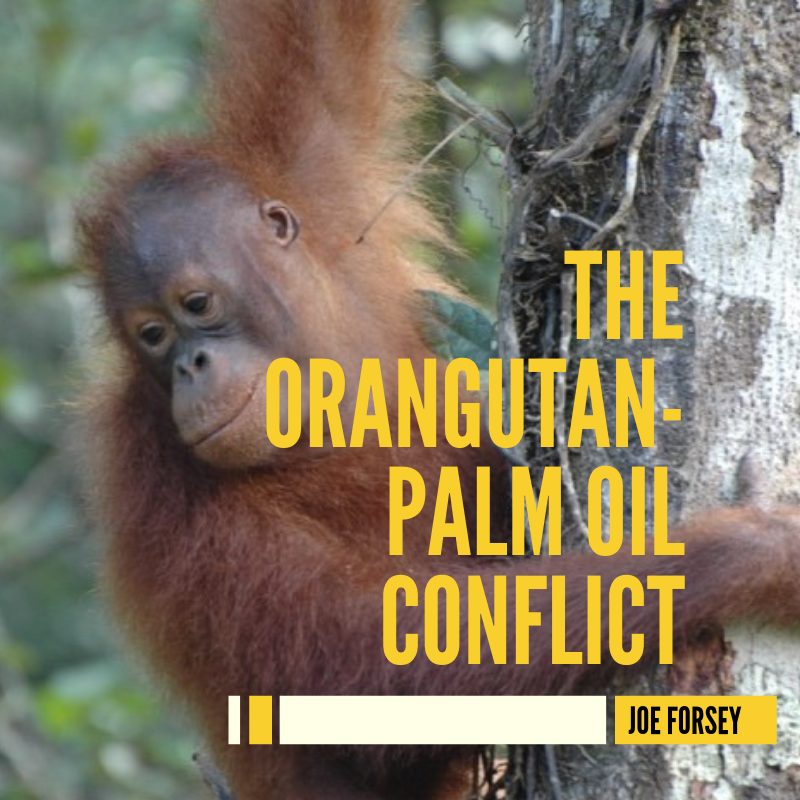
Joe Forsey (BSc Economics)
The Orangutan-Palm Oil Conflict
Time is running out for orangutans. In 2016 the International Union for Conservation of Nature classed the species as critically endangered (Ancrenaz et al., 2016), one slip away from extinction Read full article

Christina Portelli (BSc Economics)
Controlling Air Quality in Beijing
As the capital of the People’s Republic of China, Beijing is renowned for its rich history and culture, strong culture of innovation, and now unfortunately air pollution. Read full article
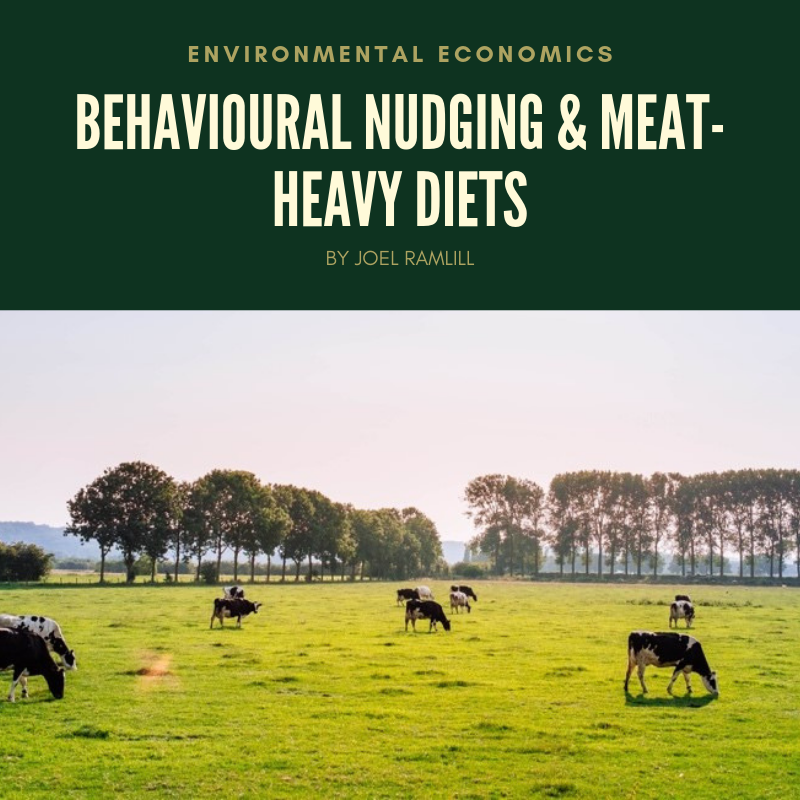
Joel Ramlill (BA/BSc Economics, Politics and International Studies)
Behavioural Nudging & Meat Heavy Diets
Food production is a major factor of greenhouse gas emissions (GHG) with just under a quarter of all GHG emissions coming from deforestation and agricultural emissions from livestock, soil and nutrient management. Read full article
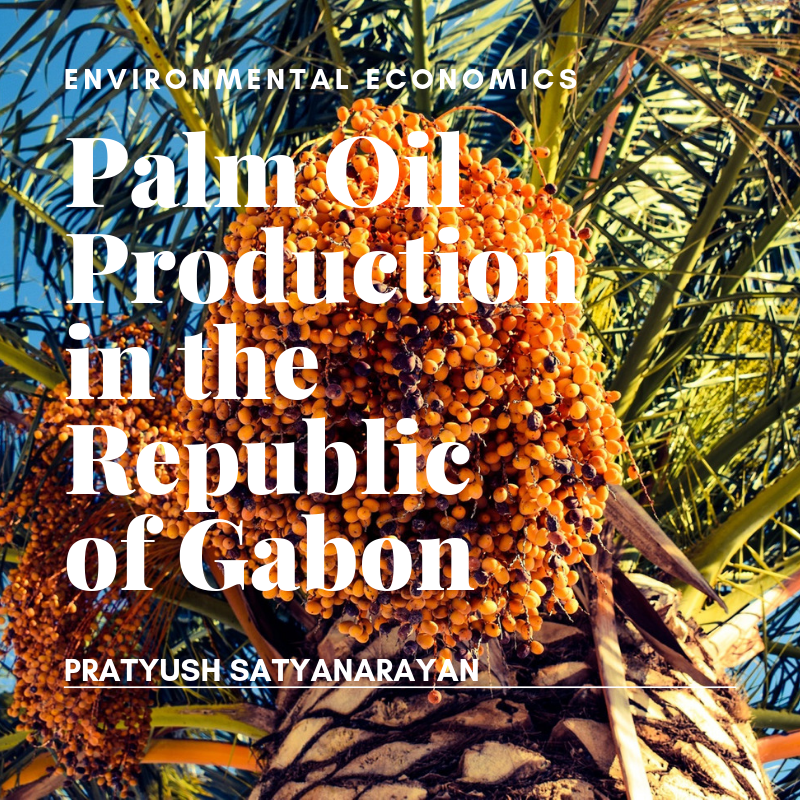
Pratyush Satyanarayan (BSc Economics)
Palm Oil Production in The Republic of Gabon
In recent decades, the global market for palm oil has grown significantly. With South-East Asia’s land availability becoming increasingly scarce, the next low-cost frontier for production is Africa, more specifically Gabon. Read full article
Two Warwick Economics students present papers at prestigious Carroll Round
Earlier this year, two final year Economics students presented their papers at the Carroll Round International Conference, which took place at Georgetown University, Washington D.C. on 11-14 April 2019, with Jonas Knecht awarded the 'Best Participant' prize.
The Carroll Round is an international economics conference which takes place annually at Georgetown University, Washington D.C and provides a unique forum for research and discussion among the world’s top undergraduates and encourages and supports scholarly innovation in the field of Economics.
Diveena Nanthakumaran and Jonas Knecht presented their papers as part of the Research in Applied Economics (RAE) module which undergraduate Economic students study during their final year of their degree course. Jonas presented his paper "An Analysis of Brexit Services Trade Effects Using a Synthetic Control Model" and Diveena's paper "The Effects of Social Interaction and Internet Usage on Stock Market Participation: Evidence from Europe".
Winning the award for the 'Best Participant' prize, Jonas said:
"It was an incredible honor to win this award, I had a great time and would really encourage all students interested in economics research to get involved with the Carroll Round when they can."
Commenting on her experience, Diveena said:
"The Carroll Round conference was a very enjoyable and insightful experience; not only is it a great opportunity to develop your own research and presentation skills but you also get exposure to different fields of research within Economics. It was also really great meeting students from a wide range of universities across the world."
Each year, Professor Gianna Boero, RAE Module Leader, invites RAE tutors to nominate students with promising dissertation projects for consideration for departmental endorsement of their submission to the Carroll Round. Those students whose submissions are successful are then given financial support by the Department of Economics to attend the conference and present the results of their research.
Year after year, Warwick Economics RAE students have excelled at the Carroll Round conference in having their submitted papers accepted and invited to present at the conference. The annual conference attracts students from top undergraduate programmes, including the universities of Chicago, Columbia, Duke, Harvard, MIT, LSE, Oxford, Pennsylvania, Princeton, Stanford, and Yale. In 2017, Tim Maecker was awarded the Prize for ‘Best Paper’ and David Henning was awarded the Prize for ‘Best Participant’. In 2016, Mihaly Abel was awarded the '‘Outstanding Participant’. In 2015 the award went to Raees Chowdhury, in 2012 to Samuel Evans and in 2011 to Nik Orlov.
Warwick Economics student reaches the finals of JMUCC
A Warwick Economics student was part of team that progressed to the finals of the John Molson Undergraduate Case Competition (JMUCC).
The John Molson Undergraduate Case Competition (JMUCC) is hosted annually in Montreal, Canada by the John Molson School of Business at Concordia University. Twenty four teams from universities around the world compete in business case studies that involve real challenges faced by real companies. These challenges range from finance to sustainability to supply chain management and require teams to think on their feet, particularly in the 3-hour rounds and Q&A sessions.
Arjun Mohan, a second year Undergraduate student studying BSc in Economics was amongst four students chosen to represent the University of Warwick at JMUCC after they competed in the internal Warwick Case Challenge and won. Arjun and his team were then given training provided by the University, which involved practice cases and sessions with professional consultants.
Commenting on the training, Arjun had this to say "Training was challenging as it did not involve technical skills or brainstorming but rather, focused on how to “sell” an idea - a skill not taught in the classroom."
Five Day Overview
Arjun documented each of his days during the JMUCC and reflected on the impact the competition has had on his personal development.
Day 1 - We arrived in Montreal for Day 1 of JMUCC which involved an opening cocktail and ceremony where we had the opportunity to interact with other delegates. This set the tone for what was a competition with a very social environment - great emphasis, was placed on bringing business students from around the world together and encouraging social and professional connections which would exist beyond our week in Montreal.
Day 2 - 4 - These two days consisted of a number of rounds where as a team, we were given three hours of preparation time for the case. Then, we had to present for fifteen to twenty minutes in front of a panel of judges, before a ten-minute Q&A session. Round 1 was about a small accounting firm and involved issues in Finance and Human Resource. In Round 2, we worked with a sustainability problem faced by a large fashion brand. Round 3 was based on a large bank and problems with user experience of their wealth management app.
The highly diversified nature of the cases worked well with our team strategy. We would first rigorously break down the problem presented and understand how it linked to the firm’s bottom line. We would then decide on the targeted customer segments and accordingly develop ideas to solve the problem.
What set our approach apart from the other teams was that we focused not on brainstorming, but on the implement-ability of our ideas. Using the information presented to us and setting up various reasonable assumptions, we would assess the potential impact of our ideas. Then we would focus on the ideas that could bring us to our desired impact and find information to back up our proposals as well as set up a presentation to sell these proposals convincingly to the audience.
Day 5, 6 and 7 - On the fifth day, we spent time reflecting on the performance of our team so far as well as time to go out and explore the city of Montreal. On day six, we were given our final case study and 24 hours to solve it before presenting to a panel of judges on Day 7. This proved to be the most challenging case that we faced as it involved a massive railway freight company and presented problems involving logistics and supply chain management. Eventually, we emerged from every round as the winning team. This very quickly caught the eyes of organisers and other participants as this was our University’s first time at a case competition and we had formed our team just weeks prior to JMUCC.
On the other hand, most teams’ universities had been represented at JMUCC for several years already and they had been preparing for the competition for at least 4 months. I believe that this was a product of our unique, detail-oriented and practical approach which had a laser sharp focus on developing a strong plan of implementation for each of our proposals, rather than merely suggesting creative ideas – as most teams did.
Having won in our division, we were then one of seven teams to progress to the Finals of JMUCC. In the Finals, we re-presented our 24-hour case study proposal in front of a larger audience of approximately 100 people including 10 judges, who were all from the actual company in the case study. Undeniably, this was a nerve-wrecking experience as the audience was large and we even had an accidental slip-up with the PowerPoint clicker provided to us in the middle of the presentation. However, we still put on a fantastic presentation and impressed the judges as we knew our proposal very well and were confident in its ability to solve our client’s problems.
Final Reflection
Looking back, JMUCC was an absolutely fantastic experience for many reasons but two in particular stand out. Firstly, I got to know students from many universities around the world and it was eye-opening to hear their perspectives of issues within as well as beyond the scope of the competition. Secondly, I had to solve business problems that I had never come across before for real companies and I then got to present our team solutions to industry professionals and hear their feedback on our presentations. This provided an amazing opportunity to develop my business acumen and not only expand my ability to solve problems, but also my ability to sell my proposals well.
Warwick Economics team win first place at Grand Economics Debate two years in a row
A team of articulate students from the University of Warwick win first place in The Economics Debate at City Hall in London.
The distinctive oval shaped building known as City Hall on the banks of the River Thames was the venue for this year's grand final of The Economics Debate 2019. Organised by University College London (UCL) , the Institute of Economic Affairs, Oxera Consulting and The Economist Intelligence Unit, the event brought together debating teams from six leading UK universities: London School of Economics (LSE), University of Warwick, University of Cambridge, UCL, Durham University and University of Bristol.
The team from the University of Warwick consisted of Ashish Ramuni (PPE), Jeremy Chen (Economics), Greg Tucker (Economics) and Shermeen Saud (PPE). They debated in favour of the motion that “Open borders do not add sufficient value to the economy” which led them to beat the UCL team in the Grand Final and retain their number one position for the second year in a row. The team impressed a panel of judges composing of Dr Steven Davies, Head of Education at the IEA, Dr Helen Jenkins, Managing Partner at Oxera, and Dr Douglas Lippoldt, Chief Trade Economist at HSBC.
Commenting on winning first place, Shermeen Saud had this to say:
"The debate was a thrilling but challenging experience. Throughout, the Warwick Team definitely had the less convincing side of the motion, from arguing that closed borders are good for the economy to justifying that the IMF is not biased towards developed countries. After evenings spent deliberating over motions and last minute practising, the final result is something I and the team are incredibly proud of. I grew and learnt so much each time, and I would definitely recommend getting involved in it in the future!"
In the previous rounds, the team researched extensively to win their debates against Durham University and University of Cambridge in the quarter and semi finals and are proud to have held onto their unbeaten record. This was especially impressive having also been given difficult motions such as arguing against the proposal that “Developing countries should move towards a cashless economy” versus Durham University, and in opposition to the idea that “The International Monetary System is biased towards developed nations” against University of Cambridge.
Having worked hard and grown in confidence over the weeks, the team was elated to see their hard work and time paid off by winning the top prizes, including an internship at the Institute of Economic Affairs, a fast-track for an internship at Oxera and £300 cash. For the second year in a row, the team is glad to show the skills they have honed over their years at the University of Warwick. The team's success was especially impressive considering the highly technical and interdisciplinary nature of the debates and the fact that they debated against three Masters students in the final.
Undergraduates join departmental staff for an evening of dinner and quiz
Undergraduates from the Department of Economics along with academic staff had their general knowledge put to the test in an dinner and quiz event.
Over 200 participants attending the the evening comprising of students from Year 1, 2 and 3 and members of staff from the Department. The evening started with teams being formed from students in different year groups, thus, presenting an opportunity for students to get to know each other from different courses and to share their experiences.
The evening was wrapped up with the winning team (The Barbie Dollz) winning the quiz with the most correct answers. They were each awarded with £10 top up on their Eating at Warwick cards. You can view photos from the event on our Photo Gallery below.
Photo Gallery
Students' Question Time 2019
The Department of Economics and PAIS were delighted to host our annual Student Question Time debate on Monday 28th January 2019.
Based upon the popular BBC Television show, a panel comprising of students from Economics and PAIS were selected from a pool of applicants to answer students' questions on topics relating to current affairs.
Skilfully chaired by Tatiana Coutto, a Teaching Fellow (European Studies) and Course Director for Politics, International Studies and Modern Languages, the panel which consisted of undergraduate students, Daniel Henein, (Y1 Economics), Shreya Thummar (Y2 EPAIS), Remi Trovo (Y1 PAIS) and Ellen Humphreys (Y3 PAIS) debated current affairs. The event attracted over 150 students who are currently studying a range of disciplines within the Social Sciences Department at the University of Warwick.
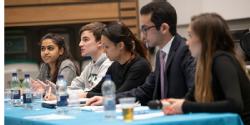
There were no easy answers to complex questions about the Brexit deal, the climate change as the greatest threat to humanity, the crisis of young people's emotional and mental health or inequalities in society. But the student panellists talked confidently and with passion about how we should all start taking smaller steps in everyday life to achieve a long term goal. There was also a suggestion that the main political parties should start working collaboratively to avoid a no deal Brexit.
These questions opened up interesting debates with the audience who were also given the opportunity towards the end to ask further questions relating to the topics raised at the event.
I personally think that it is vital for students to engage in intellectually stimulating discussions on important current affairs topics that affect us daily. It was intriguing to hear debates on a range of topics such as mental health and gender inequality which are particularly important to me
Student Question Time is a great opportunity to see what what Warwick's best students are capable of, and also to get their views on some of the most pressing issues today, as seen through a student's perspective
Missed the debate? Watch the full length video here
For those of you that missed the event or would like to watch the debate again, the full length video is available to watch via the link below.
Two Economics students reach the finals of IAES 'Best Undergraduate Paper' Competition
Mary Polyakova and Paul Noller were selected as two of the four finalists at this year's International Atlantic Economic Society’s 14th annual Best Undergraduate Paper Competition (IAES).
The International Atlantic Economic Society invites students from across the globe to compete in the IAES annual Best Undergraduate Paper Award (BUPA) competition. The competition recognises and rewards outstanding research conducted by undergraduate students. Each year, four finalists are selected to present their research in person.
This year, two of our students, Paul (BSc Philosophy, Politics and Economics) and Mary (BSc Economics, Politics and International Studies) were selected amongst the four finalists and invited to present their research paper (which they completed as part of their RAE module) at the International Atlantic Economic Society Conference held in New York, last October.
Their papers which merited them the status of finalists of the competition were:
- Paul Noller, Evaluating the Credibility of the European Bank Bail-in Commitment, University of Warwick, UK
- Mary Polyakova, Child Marriage and Female Educational Attainment: an Investigation into a Complex Relationship, Using Nigerian Data, University of Warwick, UK
The other two finialists were:
- Donato Onorato, Robots, Unions, and Aging: Determinants of Robot Adoption Evidence from OECD Countries, University of Pennsylvania, USA
- Iuliia Vasileva, The Effect of Inflation Targeting on Foreign Direct Investment Flows to Developing Countries, Lafayette College, USA
This year's first prize went to Iuliia Vasileva who received a $500 cheque and will have her paper printed in an upcoming issue of the Atlantic Economic Journal. Paul, Mary and Donato each received $100 and have been invited to have an 800 word abstract of their papers published in the Atlantic Economic Journal. Additionally, each student received a handsome commemorative plaque to mark the occasion.
Speaking about his experience, Paul said:
Attending and presenting my research at the IAES conference was a most rewarding and fascinating experience. Moreover, having my paper published in the Atlantic Economic Journal is my greatest academic achievement so far, which I hope will be a road towards having a genuine impact on the literature in my field. My gratitude goes to the IAES for considering my work worthy of such a distinct audience and the Warwick Economics department for their unwavering support of my project and application to the IAES
Commenting on the students reaching the final stage, Module Leader of Research in Applied Economics (RAE), Professor Gianna Boero, said:
"I am delighted to see that year after year Warwick students studying Economics have enjoyed unparalleled success in high-profile global undergraduate research conferences and competitions for the quality and originality of their RAE dissertation. Many congratulations to Paul Noller and Maria Polyakova for reaching the final stage of the prestigious IAES Undergraduate Paper Competition. This is a remarkable achievement for them, for the Department and for the University"
[Top photograph: Paul, Donato pictured with the winner Iuliia holding their commemorative plaque recognising their accomplishment (Mary is not pictured) and Paul presenting his paper at the conference]
Past finalists and winners of the IAES event
This is not the first time Economics graduates have been selected for this award.
Last year, the department saw graduates Gytautas Karklius and Yin Li Toh present their papers at the final stage of the IAES competition.
In 2016, Adam Brzezinski won first place for the 'Best Undergraduate Paper' at the Atlantic Economic Society Conference. His paper was the product of his third year Research in Applied Economics (RAE) project, entitled 'Synergies in Labour Market Institutions - the nonlinear effect of minimum wages on youth employment'.
In 2015, Hameem Raees Chowdury, and Virginia Minni present their papers at the final stage of the IAES competition, with Hameem going on to win first place. His winning paper entitled “Joint-Liability in Microcredit: Evidence from Bangladesh”, was included in the Atlantic Economic Journal.
related: https://warwick.ac.uk/fac/soc/economics/news/2016/9/economics_undergraduate_adam_brzezinski_nominated_for_iaes_best_undergraduate_paper_competition/, http://www.iaes.org/
No pins left standing at the second Economics Bowling Night
Over 140 Economics students from all years demonstrated that bowling was right up their alley during an evening at Tenpin in Leamington Spa.
Following excellent feedback from the last year's bowling event, we organised our second Tenpin Bowling night on Tuesday 30 October 2018, with undergraduate Economics students from different years attending and getting involved along with members of staff from the Department.
With the brightly lit lanes, students and staff swapped their regular trainers and shoes for bowling shoes to see if it would be a strike or a gutter ball. Teams were formed on the night with a good consistency between students and staff. The evening provided a relaxed atmosphere to meet one another, share their experiences whilst enjoying knocking down a row of bowling pins.
Food and drink was available to purchase throughout the evening with 50% off. The event was a success and was one of the ways in which we responsed to feedback for more social and sporting events with integration across years.
It was great to see so many familiar and new faces across the department. My friend loved the event so much that she stayed until midnight, despite getting up at 4am for an assessment centre the next morning! My highlight was coming joint with Jeremy but I’ll definitely be sticking to a future career in economics
Feedback
We would love to hear what type of events you would like us to organise in future, whether you attended Tenpin Bowling or not. Let us know your ideas, thoughts and feedback via our Anonymous Feedback Form.

